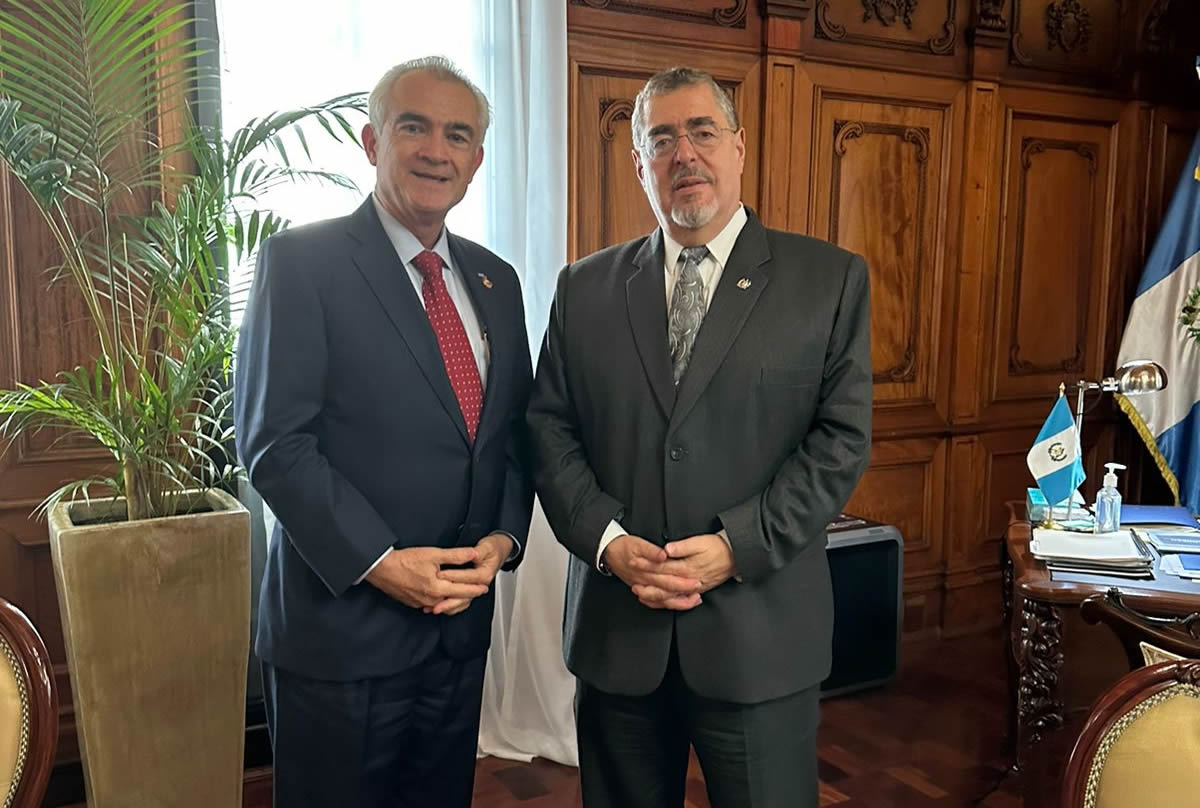ECLAC’s Executive Secretary Met with Guatemalan President Bernardo Arévalo de León
Work area(s)
The United Nations regional economic commission and the Government of Guatemala align efforts to quicken the pace in moving towards more productive, inclusive and sustainable development in the Central American country.

In the framework of his official visit to the country, the Executive Secretary of the Economic Commission for Latin America and the Caribbean (ECLAC), José Manuel Salazar-Xirinachs, met today in Guatemala City with the President of the Republic of Guatemala, Bernardo Arévalo de León, where they discussed the current cooperation agenda between the Government and the United Nations regional organization and explored areas of collaboration for the Central American nation’s development.
ECLAC has stressed the importance of Latin American and Caribbean countries invigorating their growth and making it more inclusive and sustainable through production efforts in dynamic sectors and the latest productive development policies to produce structural change and productivity growth, José Manuel Salazar-Xirinachs emphasized.
President Arévalo underlined the importance of thinking about long-term prospects that would allow for the design of State policies for the country’s development that identifies strategic development goals and rallies the efforts and resolve of diverse national stakeholders.
ECLAC and the Government of Guatemala will expand diverse areas of collaboration aimed at enhancing the country’s development. ECLAC has indicated that the Guatemalan economy’s average growth rate in the last two decades (3.5%) has not been sufficient to address the country’s significant social lags in terms of poverty, decent housing and malnutrition, for example. Gross capital formation represents around 17% of GDP, which is well below the level seen in East Asia (37%), the European Union (25%) and even the Latin American average (20%).
ECLAC’s Executive Secretary stressed the need for Guatemala to have a productive development strategy as a central engine for achieving higher growth levels based on rising productivity, more balance in territorial development, and more quality job creation.
José Manuel Salazar-Xirinachs noted that Guatemala has valuable opportunities in sectors as varied as the health-care manufacturing industry, agroindustry, sustainable tourism and renewable energy, and it has a large and dynamic youth population that is critical for developing new areas of employment and new dynamic sectors. In addition, it is a leading country in the Central American integration process, which has turned it into the region’s top exporter and Central America’s biggest market.
ECLAC urges for, and has offered collaboration on, the adoption of a new investment agenda that would drive growth, create more formal employment and move towards more sustainable development.
The United Nations regional organization recommends deploying a new investment agenda centered on policies aimed at promoting productive transformation and improving financing and human capital. For this undertaking, it is critical to:
- Work on strengthening public governance and strengthening institutions’ technical, operational, policy and foresight capacities, along with efficient regulations and greater transparency and integrity.
- Promote driving or dynamic sectors with important opportunities for growth and job creation, including agriculture and sustainable food systems, renewable energy, and health and the care economy.
- Align this investment agenda with productive development policies, through close collaboration between the public and private sectors and the academic world, both at a national and subnational level, using the approach of productive clusters.
- Improve investment financing by better orienting public expenditures; adopting more solid fiscal frameworks; and fostering the expansion of innovative debt instruments, particularly green, social, sustainable and sustainability-linked bonds.
- Improve targeted social protection and education policies that would close gaps in access and prompt an educational transformation towards inclusivity, with emphasis on rural populations, indigenous peoples and gender equality.
As part of his official visit, ECLAC’s Executive Secretary held a meeting with Patricia Joachín Godínez, Deputy Minister of Public Finances, and on Tuesday, March 5, he was scheduled to meet with Abelardo Pinto Moscoso, Minister of Social Development; Carlos Ramiro Martínez, Minister of Foreign Affairs; Gabriela García, Economy Minister; and Carlos Mendoza Alvarado, the Secretary for Planning and Programming of the Office of the President.
He planned to conclude his visit by delivering a lecture at the Guatemalan Foreign Ministry, entitled “Analysis of the economic and social situation in Latin America and the Caribbean: Prospects for 2024 and long-term challenges.”
Subregional headquarter(s) and office(s)
Country(ies)
-
Guatemala
Contact
Public Information Unit
- prensa@cepal.org
- (56 2) 2210 2040